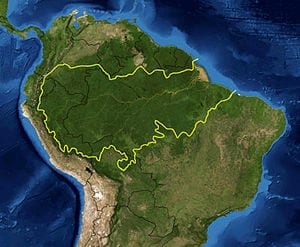
An international team has found that a troubling net loss in diversity among the microbial organisms responsible for a functioning ecosystem is accompanying deforestation in the Amazon rainforest, leaving it less able to deal with added outside stress
An international team of microbiologists led by Klaus Nüsslein of the University of Massachusetts Amherst has found that a troubling net loss in diversity among the microbial organisms responsible for a functioning ecosystem is accompanying deforestation in the Amazon rainforest.
Nüsslein, an expert in tropical rain forest microbial soil communities, says, “We found that after rainforest conversion to agricultural pastures, bacterial communities were significantly different from those of forest soils. Not only did the pasture soils show increased species numbers, these species were also less related to one another than in rainforest soil. This is important because the combination of lost forest species and the homogenization of pasture communities together signal that this ecosystem is now a lot less capable of dealing with additional outside stress.”
He and colleagues studied a large farm site over the past four years at the frontier where farmers drive agriculture into pristine rainforest in Rondonia, Brazil, to convert rainforest to agricultural use. Findings in part validated previous research showing that bacteria in the soil became more diverse after conversion to pasture. However, in its fourth year, their study overcame limitations of earlier investigations to show that changes in microbial diversity occurred over larger geographic scales. Results appear in the current issue of Proceedings of the National Academy of Sciences.
In addition to Nüsslein at UMass Amherst, the research group includes first author Jorge Rodrigues at the University of Texas at Arlington with Brendan Bohannan at the University of Oregon, James Tiedje at Michigan State University, and others at the University of Sao Paulo. Lead investigators Nüsslein and Rodrigues emphasize that the study is an equal collaboration among the four research groups.
Findings do not support earlier study conclusions, instead they show that the loss of restricted ranges for different bacteria communities results in a biotic homogenization and net loss of diversity overall. Scientists worry that the loss of genetic variation in bacteria across a converted forest could reduce ecosystem resilience. The researchers hope their work will provide valuable data to those making decisions about the future of the Amazon rainforest.
Biologist and first author Jorge Rodrigues of the University of Texas at Arlington adds, “We have known for a long time that conversion of rainforest land in the Amazon for agriculture results in a loss of biodiversity in plants and animals. Now we know that microbial communities which are so important to the ecosystem also suffer significant losses.”
As Nüsslein and colleagues point out, the Amazon represents half of the world’s rainforest and is home to one-third of Earth’s species, yet the Amazon has one of the highest rates of deforestation. Agriculture is one of the largest and most dynamic parts of Brazil’s economy, so dealing with standing rainforests in the tropics will be tricky, but nevertheless, it is vital that the issue is tackled.”
Read more . . .
via University of Massachusetts at Amherst – EurekAlert
The Latest Streaming News: Amazon deforestation updated minute-by-minute
Bookmark this page and come back often
Latest NEWS
Latest VIDEO







